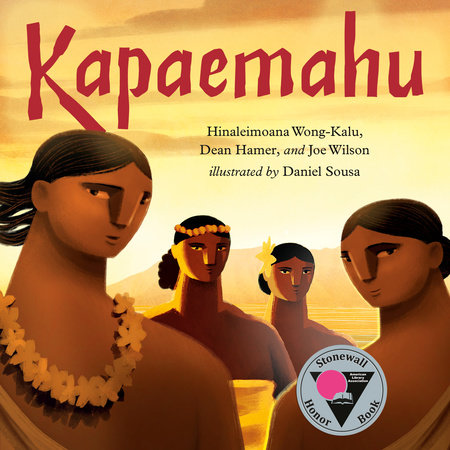 Kapaemahu is a multilayered picturebook that leaves the reader with much to contemplate. Based on a traditional Hawaiian legend, this captivating picturebook begins by transporting the reader to the days before recorded history, the time of storytelling, long before the colonization of Hawaii. In that long ago time, four Tahitians journeyed across the Pacific Ocean and arrived on the shores of Waikiki on the island of Oʻahu. These visitors were māhū, two-spirited beings who were neither male nor female but “a mixture of both in mind, heart, and spirit.” The māhū were favored by the Gods “with skill in the science of healing.” They healed many of the islanders and to honor the māhū, the people erected four great stones. Before vanishing from the island, the māhū transferred their healing powers into these four stones. Following the telling of the history of the māhū, the story moves the reader ahead seven hundred years in history to witness the impact of colonization upon the stones and subsequently the culture of the Native Hawaiians. The book ends with the call to remember the story of the māhū declaring, “When you share that story, you honor it.”
Kapaemahu is a multilayered picturebook that leaves the reader with much to contemplate. Based on a traditional Hawaiian legend, this captivating picturebook begins by transporting the reader to the days before recorded history, the time of storytelling, long before the colonization of Hawaii. In that long ago time, four Tahitians journeyed across the Pacific Ocean and arrived on the shores of Waikiki on the island of Oʻahu. These visitors were māhū, two-spirited beings who were neither male nor female but “a mixture of both in mind, heart, and spirit.” The māhū were favored by the Gods “with skill in the science of healing.” They healed many of the islanders and to honor the māhū, the people erected four great stones. Before vanishing from the island, the māhū transferred their healing powers into these four stones. Following the telling of the history of the māhū, the story moves the reader ahead seven hundred years in history to witness the impact of colonization upon the stones and subsequently the culture of the Native Hawaiians. The book ends with the call to remember the story of the māhū declaring, “When you share that story, you honor it.”
Kapaemahu opens many possibilities for dialogue. Dialogue could center around the importance of oral traditions and how these stories connect to culture, history and identity. Another important critical dialogue this text invites is the impact of colonization. The story challenges the commodification of Hawaiian culture and calls for a renewal of traditional beliefs and practices. Written as a bilingual picturebook in both Hawaiian and English, the Hawaiian language takes precedence over English on each page. Poka Laenui, a consultant on human rights and Hawaiian sovereignty (2006), describes five phases of decolonization. Phase one he states is rediscovery and recovery. This is seen in the picturebook with the recovery of the stones. Phase two is mourning. The book mourns the loss of history associated with the māhū. Phases three through five are dreaming, followed by commitment and finally action. The last page of the book is a call to dream and to commit to the action of telling this history. The colors selected for the illustrations add another layer to consider through dialogue. The opening account of the māhū is illustrated in deep vibrant warm colors of yellow, gold and red. There is an abrupt change to a cold color palette when the reader turns the page to encounter the time of colonization. The traditional warm colors finally return on the last spread with an image of a Hawaiian child whose eyes are filled with light and determination, looking to the future. “Unearthing the path of our past leads to our future” is printed on the back cover of the book.
Kapaemahu was selected as a Stonewall Honor book in 2023 by the American Library Association. This book can be used across grade levels from upper elementary through middle and high school. The back matter in the book provides an extensive author’s note along with a glossary and an explanation of the Hawaiian Olelo Niihau dialect used in the text of the story. There is also more information on the history of the Healer Stones. Before Kapaemahu became a picturebook it was an Oscar-nominated animated short film. Daniel Sousa animated the film as well as illustrated the picturebook. Kapaemahu is written by Hinaleimoana Wong-Kalu, Dr. Dean Hamer and Joe Wilson. Wong-Kalu is a Native Hawaiian māhū, or third-gender person as well as a transgender woman who is a teacher of the Hawaiian language, a cultural practitioner and a filmmaker. Dr. Hamer is a scientific researcher and filmmaker. He is best known for his research on understanding human sexuality and the study of genetics and religion. Joe Wilson is a director and producer of short films. Students can gain a deeper appreciation for the story and the Olelo Niihau dialect by watching the short, animated film version accessible through the PBS website. This website also provides excellent classroom resources for teachers. -Recommended by Cynthia Ryman, California State University Monterey Bay
References
Laenui, P. (2006, May 30). Processes of decolonization. San Jose State University. https://www.sjsu.edu/people/marcos.pizarro/maestros/Laenui.pdf
Title: Kapaemahu
Author: Hinaleimona Wong-Kalu, Dean Hamer and Joe Wilson
Illustrator: Daniel Sousa
ISBN: 9780593530061
Publisher: Kokila
PubDate: June 7, 2022
Each month a committee of Worlds of Words advisors recommends a book published within the last year. Our hope is to spark conversations on our website and on social media about the book that expand global understandings and perceptions. Please join us by leaving a comment. You can also share your thoughts with us by using the hashtag #WOWRecommends on social media. Check out our alphabetical listing of all the books featured in WOW Recommends.
- Themes: Cynthia Ryman, Daniel Sousa, Dean Hamer, Hinaleimona Wong-Kalu, Joe Wilson, Kapaemahu
- Descriptors: WOW Recommends
